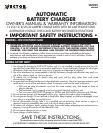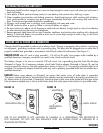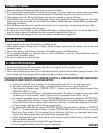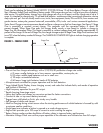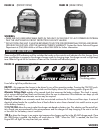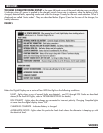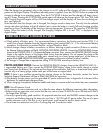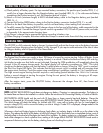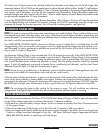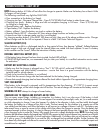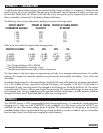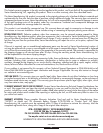
9
This slowly (over 24 hours) removes the insulating buildup from the plates so the battery can hold a full charge. Most
automotive batteries (50
to 70AH) can be treated once to reduce the lead sulfate buildup. Smaller 12 volt batteries,
such as found in jump starters can be treated for 12 hours. However, depending on the severity of lead sulfate buildup
and a larger size of the battery, up to five 24 hour treatments may be necessary. Battery Recondition mode auto-
matically operates and then times out after 24 hours. When a smaller battery is treated, Battery Recondition mode
can be manually stopped after 12 hours of treatment.
To start the RECONDITION MODE, press Battery Recondition. After 24 hours the timer will stop the operation
and the Digital Display will indicate F04 (timeout). Pressing the ON/OFF pushbutton stops the charger and
prepares the charger for the next operation. You will see the circulating pattern, see Figure 4B.
ALTERNATOR VOLTAGE CHECK
NOTE: This check is not accurate for every make, manufacturer and model of vehicle. There is wide variation in user-
controlled electrical loads, alternator output, and wiring. Other factors include battery condition, temperature, and
engine idle speed. It is recommended to check your alternator when it is known to be operating properly to verify that
this check is valid for your particular vehicle.
The ALTERNATOR VOLTAGE CHECK measures a defined range of voltage that is available from the fully
charged battery. The user must allow the engine to warm to normal operating temperature and achieve a nor-
mal idle speed. As many appliances as possible are turned off for the first part of the check to allow the bat-
tery to reach it’s highest voltage level.
The Alternator Voltage Check is only activated after 10 to 30 minutes of engine idle. If the ALTERNATOR GOOD
LED lights, then the ON/OFF button is pressed to stop the check. Alternator Voltage Check is then repeated
after many appliances are turned on to check the alternator output under a greater load. If the first (unloaded)
and second (loaded) checks indicate the alternator is good, then the entire procedure should be repeated
again. If after all appliances are turned on (except for air conditioning and defroster), and the check shows
Alternater Good LED lights, it is likely that the alternator is good.
NOTE: Do not turn on air conditioning, or the defroster system to load the alternator. These appliances may start
operating in the middle of a measurement cycle and give an invalid results.
If the first check indicates the alternator is good, and the second or third repeat of the check indicates the alter-
nator is bad, there probably is some problem in the system. Problems can range from loose fan belts to a diode
going bad in the alternator. To begin the check press Alternator and to stop the check press ON/OFF. Note that
the FAULT light will light when the Alternator is bad; a good Alternator will light the Alternator Good LED.
NOTE: Do not charge the battery while waiting for the engine to warm. This will invalidate any alternator
voltage check. The Digital Display should show the circulating pattern while the engine is warming.
CARE AND MAINTENANCE
With only minimal maintenance, this Vector 2/10/20/40 Smart Battery Charger will deliver years of dependable
service. Follow these simple steps to maintain the charger in optimum condition:
• After each use, clean the battery charger clamps - be sure to remove any battery fluid that will cause corrosion
of the copper clamps.
• Clean the outside case of the charger with a soft cloth and, if necessary, mild soap solution.
• Keep the charger cords loosely coiled during storage to prevent damage to the cords. Do not use the charger
if cords or clamps have been damaged in any way - call Vector Technical Support Department toll-free at
(866) 584-5504 for details on replacing cords and clamps.
VEC093
A062003



